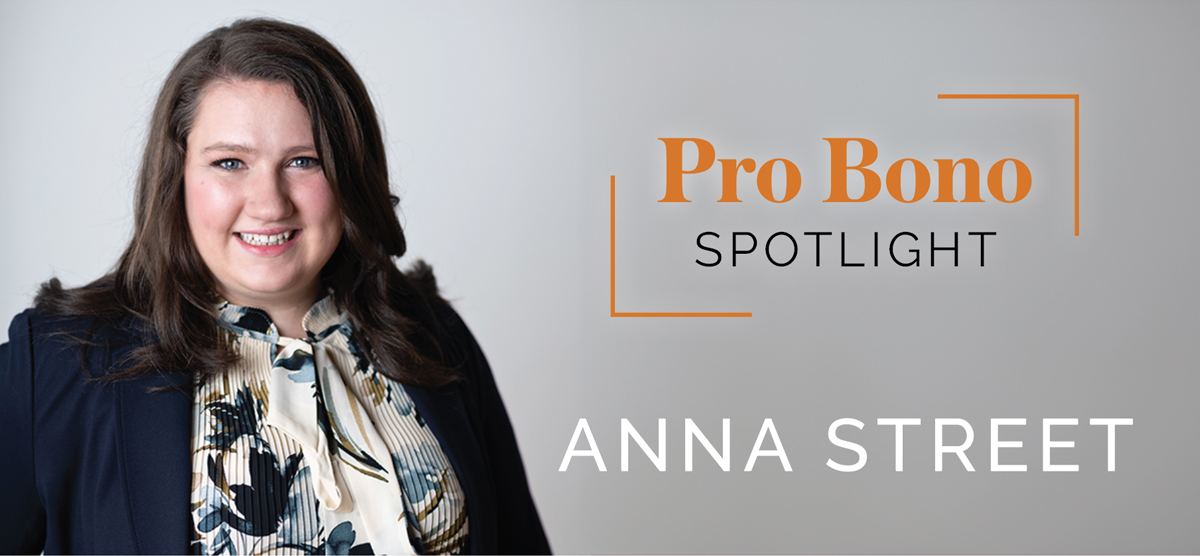
How did you get involved with SMRLS? How long have you provided pro bono services with SMRLS?
I got involved with SMRLS about a year ago when a partner at my firm took on a pro bono case. Prior to that I was working at another legal aid office. I have been consistently taking pro bono cases ever since.
How do you find time for pro bono work with the many competing demands of life?
I believe it is important to give back to the community that you live and work in, and as a lawyer we have a special skill set to help our community. Because of this belief, it does not feel like it is hard to make time for pro bono work.
The cases I have seen come from SMRLS thus far have been straight forward and a nice way to get into court without too much pressure. Doing a couple hours a month of pro bono case work to keep a case moving forward does not seem overwhelming in the scheme of all we do as attorneys.
What resources or support—from SMRLS, your firm, or somewhere else—have been valuable to you as you engage in pro bono work?
I was able to reach out to managing attorney, Monica Dooner Lindgren from SMRLS family law unit, when I had a question and was provided with some sample pleadings.
My firm is very supportive of pro bono opportunities. Most partners take pro bono cases on themselves. My staff at my firm are also supportive and always willing to help on cases. It feels like a team effort to give back to our community.
What are barriers to access to justice specific to family law? How does your work with SMRLS address gaps in access to justice?
The barriers I see in family law to access to justice are all the supportive resources families with more money have available to them to resolve their cases. Things like supervised visitation centers, reunification therapy, specialized parenting classes all cost money. By working with SMRLS to provide pro bono services it frees up a family’s financial resources to focus on healing and moving the family forward instead of on an attorney.
So many people simply need an attorney to lead them through a process. taking on those pro bono cases that are not necessarily legally complicated but are still scary and confusing for pro se individuals is valuable to making the justice system accessible to all people in our community.
What strategies do you use to ensure that you’re an effective advocate for everyone you represent?
Going to presentations and events with AFCC has been so helpful to receive training on the psychology/social science behind issues that family law attorneys see every day. The information I get from these presentations has been essential for advocating for clients. Not only does it make me more effective when advocating but I believe I am better at counseling clients on different ways to view situations or strategies for interacting with their children.
What advice do you have for newer attorneys looking to get involved with pro bono work?
Be proactive. Go to events that are focused on pro bono opportunities to find out what options are in your area of expertise. The MSBA New Lawyers section had a happy hour to introduce new lawyers to different pro bono opportunities this year, and hopefully will continue to have those happy hours in the future. Connect with an organization that has a pro bono opportunity and talk about what that would look like. Starting small is a great first step – do one 3 hour clinic to begin with and see if that feels overwhelming with the rest of your responsibilities. If it doesn’t, see if you can add in another clinic or a case next.
What’s something you’re loving right now?
I hope no one will judge me for this but I am a true fan of the Kelce brothers New Heights podcast. As a Taylor Swift fanatic, I love all of the little insights listeners get into two men who are able to express their emotions and show a very positive version of masculinity.
Interested in using your skills to help SMRLS provide high-quality free legal representation? Visit SMRLS.org/volunteer to get started.